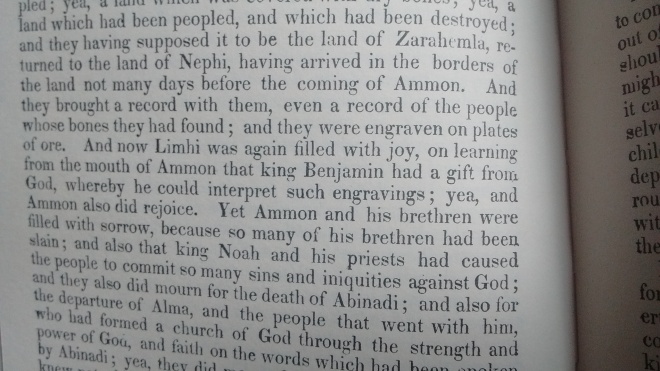And now we catch back up to the “present” after the flashback scene (just before we embark on another flashback scene with Alma!). There’s a few things in this chapter that caught my eye today.
The first is in verses 24-26:
But when he found that they were not, but that they were his brethren, and had come from the land of Zarahemla, he was filled with exceedingly great joy.
Now king Limhi had sent, previous to the coming of Ammon, a small number of men to search for the land of Zarahemla; but they could not find it, and they were lost in the wilderness.
Nevertheless, they did find a land which had been peopled; yea, a land which was covered with dry bones; yea, a land which had been peopled and which had been destroyed; and they, having supposed it to be the land of Zarahemla, returned to the land of Nephi, having arrived in the borders of the land not many days before the coming of Ammon.
We could have perhaps inferred this before, but this seems to be the first time it is clearly stated: those who’d set off to obtain help from Zarahemla and found the destroyed cities of the Jaredites instead thought they actually had reached Zarahemla. But rather than being their last source for help, they found nothing but ruins and evidence of an extinct people. It must have seemed truly hopeless (it’s like that scene in Battlestar Galactica – the “new” one – where they find “Earth” only to find it a nuked out wasteland). So when Ammon and party announced that they actually were from Zarahemla, there must have been some (good) emotional whiplash.
Next is perhaps a more minor note, but verse 28 reads:
And now Limhi was again filled with joy on learning from the mouth of Ammon that king Mosiah had a from God, whereby he could such engravings; yea, and Ammon also did rejoice.
However, in the 1830, the line (the 1830 edition doesn’t have verses) reads a little differently:
And now Limhi was again filled with joy, on learning from the mouth of Ammon that king Benjamin had a from God, whereby he could such engravings; yea, and Ammon also did rejoice.

See!
What’s going on here? Is this a mistake? Well that’s possible (the Book of Mormon, after all, disclaims inerrancy on its very title page). That’s probably why it got changed to Mosiah in the 1837 edition, although Benjamin is also on the printer’s manuscript (see Royal Skousen’s Analysis of Textual Variations part 3, in which he goes into this verse in some detail in pp. 1418-1421. As he notes, Ether 4:1 similarly originally read Benjamin and not Mosiah). It could of course be an error on Mormon’s part. However, it’s possibly not an error at all and should read Benjamin. Note that in Mosiah 6 it is recorded that after abdicating (becoming King Emiritus?), “king Benjamin lived three years and he died” (Mosiah 6:5). And Ammon’s party were sent to find the colonists after the people started nagging the king “after king Mosiah had had continual peace for the space of three years” (Mosiah 7:1). In other words, it’s possible that Benjamin was still alive when Ammon and his party set off, although the time frame is tight (especially for Ether 4:1, which also requires Benjamin to still be alive, if only for a short time, when Ammon returns; but again, that might actually be possible). Of course, the correct reading here matters little in terms of the principles that are being taught, but it’s interesting to think about.
A final thing that stood out to me while reading today comes from Ammon and his party’s reaction to the events they’ve been told about:
….and they also did mourn for the death of Abinadi; and also for the departure of Alma and the people that went with him, who had formed a church of God through the strength and power of God, and faith on the words which had been spoken by Abinadi.
Yea, they did mourn for their departure, for they knew not whither they had fled. Now they would have gladly joined with them, for they themselves had entered into a covenant with God to serve him and keep his commandments.
It’s interesting that Ammon has a desire to unite with the church Alma organised, although he’s already made a covenant with God during King Benjamin’s sermon. There’s a couple of more examples coming up in the next few chapters, but what I feel this really illustrates is some important differences between what “the Church” meant here and what it tends to mean to us today. We think in terms of one, singular, formal organization, and perhaps have a very monolithic picture in which it encompasses all our religious endeavours (and maybe we go too far in that sometimes; it’s in modern scripture that we are told that we should not need to be “command[ed] in all things”, and should “do many thing of [our] own free will”, D&C 58:26-27). But that’s certainly not the case with the “Church” (which, it should be remembered, is generally translating words that can be rendered as “congregation” and “community”) in other dispensations. The early Christians, for instance, continued to worship at the temple (and thus recognised the authority of the priesthood there) after the resurrection of Christ. Likewise here: King Benjamin is a seer, and an inspired man who received specific revelation from an angel on what to teach people, and taught his people so they might enter into a covenant with God. But he didn’t organize a church like Alma did, and so one who has entered into a covenant under the instruction of King Benjamin sees no contradiction in wanting to join Alma’s church, and recognises the divine hand and authority behind both.

Pingback: Mosiah 27 – David's random ramblings